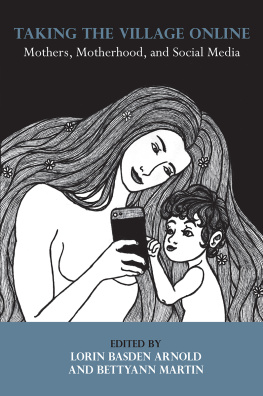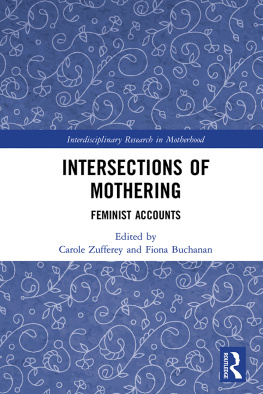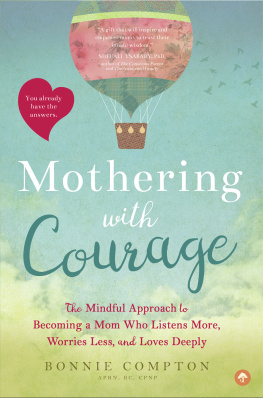TAKING THE VILLAGE ONLINE
Copyright 2016 Demeter Press
Individual copyright to their work is retained by the authors. All rights reserved. No part of this book may be reproduced or transmitted in any form by any means without permission in writing from the publisher.
Funded by the Government of Canada
Financ par la gouvernement du Canada

Demeter Press
140 Holland Street West
P. O. Box 13022
Bradford, ON L3Z 2Y5
Tel: (905) 775-9089
Email: info@demeterpress.org
Website: www.demeterpress.org
Demeter Press logo based on the sculpture Demeter by Maria-Luise Bodirsky
Printed and Bound in Canada
Front cover artwork: Abbigael F. Arnold, A Mother Way to Connect, 2016, pen and ink, 5.5 x 6.75.
eBook: tikaebooks.com
Library and Archives Canada Cataloguing in Publication
Taking the village online : mothers, motherhood, and social media / edited by Lorin Basden Arnold and BettyAnn Martin.
Includes bibliographical references.
ISBN 978-1-77258-082-2 (paperback)
1. Social media. 2. Motherhood. 3. Mothers. I. Arnold, Lorin Basden, editor II. Martin, BettyAnn, 1971-, editor
HM742.T34 2016 302.2310852 C2016-905997-9
TAKING THE VILLAGE ONLINE
Mothers, Motherhood, and Social Media
EDITED BY
Lorin Basden Arnold and BettyAnn Martin

DEMETER PRESS
With all gratitude to those who have carried us in mothering: to the children who have taught us through experience, the mothers who have taught us by example, and the partners who have taught us through love.
Thank you for being our village.
Table of Contents
Acknowledgements
Of course, there would be no acknowledgements to make without the hard work of all of the contributors to this volume, who hung in through multiple revisions and brought their experiences, intelligence, and passion for the subject to the table time and time again. We have learned much through working with these impressive scholars.
Demeter Press, and the amazing people that make it what it is, particularly Andrea OReilly, are owed a debt of gratitude for having faith in us to do this work and do it well, and for everything they do to promote and celebrate the study of mothering. We cannot accurately express how impactful their work has been on our lives and our scholarship.
All the mothers who have been part of our livesincluding but not limited to our own mothers (Loretta Throckmartin Branson and Betty Martin), those who mothered us when our mothers were no longer with us (Kathie Basden and Joyce Hubert), our sisters, our friends, and our online relational partnershave provided role models for mothering and allowed us to learn from their successes and their challenges. We thank them for serving in that role.
And most certainly not least, we thank our life partners, Derek Arnold and Ken Paradis, for parenting with us, supporting us, helping us fill our well of parenting patience when it is running a little dry, and loving us. We truly couldnt do any of this without you.
Introduction
Mothering and Social Media: Understanding, Support and Resistance
LORIN BASDEN ARNOLD AND BETTYANN MARTIN
I N THIS ERA OF THE INTERNET , many mothers in their twenties, thirties, and forties regularly use online social media to interact with other people, including other mothers. Although mothers are sometimes criticized for spending too much time on social media (ironically, such critiques often occur on social media), they find social media to be a welcome addition to their lives.
The following text addresses social media and motherhood from a variety of approaches and perspectives. Some authors have written chapters that are fairly traditional research. Others have provided autobiographical reflection. Others still have taken their experiences using social media in working to improve the lives of mothers as a topic of consideration, and they discuss the process and impact of those efforts. Chapters here approach social media from the point of view of readers and participants and reflect a broad range of social media types, including Facebook, blogs, discussion forums, and Twitter. As the editors of this collection, we hope that this text provides a glimpse of how and why mothers use and are affected by social media, and creates food for thought regarding how social media may be used to improve the lives of mothers.
Social media can be somewhat difficult to define but is generally understood as an online, network-based interactive channel of communication, which promotes collaborative creation and the sharing of user-generated information (Obar and Wildman). It includes such forums as blogging, discussion forums, Facebook, Twitter, Tumbler, Pinterest, and more. Because of the pervasiveness of social media use by mothers, scholars should consider its impact on their lives. According to a study done by the Pew Research Center, 65 percent of American adults used social media in 2015, which represents a 58 percent increase in only a decade. Studies in Canada suggest similar rates, with 69 percent of the population using social media in 2013 (Canadian Internet Registry Authority). Among women, rates in the U.S. were slightly higher at 68 percent. Although young adults are the greatest users of social media, its usage has substantially increased across age groups, even for adults over sixty-five (Perrin).
The overall increase in the use of social media has also been accompanied by a small slow decrease in disparity of use based on socioeconomic factors. Income is slowly becoming less of an obstacle to access, and 56 percent of those in the lowest income brackets in the United States used social media in 2015 (Perrin). Moreover, according to the Pew study, race and ethnicity are also no longer strong predictors of use: black, white, and Hispanic adults were all found to use social media at levels greater than 56 percent. Education level is still an important variable, but that, too, is declining. In the United States, 54 percent of individuals with high school diplomas, or less formal education, use social media, whereas 76 percent of those with college degrees use it (Perrin). Thus, the use of social media is rising across diverse groups, and consequently it has begun to affect a wide range of lives and life experiences.
The Pew study does not specifically examine mothers and their usage in its study; however, other research suggests that many mothers are regularly using social media. In their 2015 study about adjusting to parenthood, Bartholemew et al. show that Facebook has become a central form of communication for new parents. The researchers found that 127 of the 154 mothers participating in the study had Facebook accounts, and 82 percent of those mothers visited Facebook weekly, with over 58 percent visiting every day (460-461). Such studies illustrate that many adults in North America are using the Internet and social media with frequency and that mothers are no exception to this trend. Little research, however, has explored the reasons for this increased use of social media among mothers and the specific needs it satisfies for them.
WHY ARE MOTHERS USING MORE SOCIAL MEDIA?
Some of the increase in social media use is related to the ubiquity of online access. Almost two-thirds of Americans own a smartphone, according to a series of studies completed by Pew (Smith). This number is near double the level of ownership found in 2011. Smartphone users have continuous access to the Internet, and in these studies, most indicate that they use it quite regularly. The availability of Internet-capable devices almost guarantees near constant access to social networks, and recent research suggests this access may be particularly crucial to mothers today.











